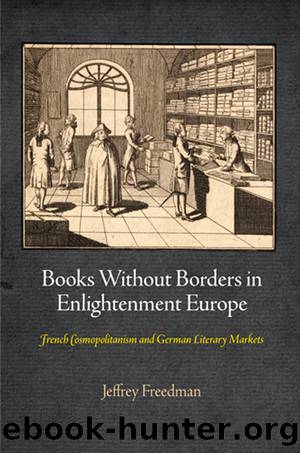Books Without Borders in Enlightenment Europe by Freedman Jeffrey;

Author:Freedman, Jeffrey;
Language: eng
Format: epub
Publisher: University of Pennsylvania Press
Published: 2012-08-15T00:00:00+00:00
So much, then, for theory: what about Sebaldus Nothanker?
It should be said at the outset that Nicolai was rather ill placed to indict the domesticating method of translation. As bookseller and Aufklärer in personal union, he knew better than anyone just how important it was to please the public, both for the sake of realizing profits and for the sake of spreading Enlightenment. French translators who assigned priority to pleasing the public were doing nothing more than Nicolai himself did in his trade as a bookseller and nothing more than Nicolai expected of the German authors whose works he published. The same stylistic failings that the STN considered it important to remedy when translating German works into Frenchââprolixity,â for example, or an excess of scholarly thoroughnessâwere also of concern to Nicolai. Of such concern to him, in fact, that he built a criticism of those failings into the narrative of Sebaldus Nothanker: first through his mocking allusions to Sebaldusâs commentary on the Book of Revelationâa veritable monument to the self-indulgence of German Gelehrsamkeitâand then, most important, through a long conversation between Sebaldus and a German bookseller named Hieronymous, a character who serves in the novel as a mouthpiece and fictional alter ego of Nicolai. In response to the questions that Sebaldus puts to him about the nature of German literary life, Hieronymous establishes a contrast between French and German authors: between the French hommes de lettres, who write for a large reading public, and the German Gelehrten, who merely write for one another. The German public does not care what German scholars think, Hieronymous laments, because German scholars do not care about the public: the indifference is mutual and mutually harmfulâfor the public because it is cut off from a source of Enlightenment, for scholars because they are condemned to social isolation. The lament is intended to arouse concern in the reader, as it does in Sebaldus who listens to it. And it confers added significance on the enormous popularity that Nicolaiâs novel enjoyed among German readers: at the same time that Nicolai bemoaned the breakdown of communication between authors and public in his novel, he restored that communication through his novel. The fit between the message and the medium was perfect, much like the fit between Nicolaiâs roles as author and bookseller. From his long experience of selling books, Nicolai knew what books would sell. He also knew, therefore, how to package what he wrote so that it would catch the eye of the public.85
Sebaldus Nothanker, for example, Nicolai packaged as the sequel to another work published several years earlier, a short and highly popular âprose poemâ entitled Wilhelmine oder der vermählte Pedant (Wilhelmine or the Newlywed Pedant). From that earlier work, Nicolai drew, superficially at least, two of the characters of his novel: Sebaldusâs wife, Wilhelmine, and Sebaldus himself. Otherwise, his novel bore scant resemblance to the earlier work. Anyone who purchased Sebaldus Nothanker in the expectation of acquiring Wilhelmine Part II would have been a victim of false advertising.
Download
This site does not store any files on its server. We only index and link to content provided by other sites. Please contact the content providers to delete copyright contents if any and email us, we'll remove relevant links or contents immediately.
Asking the Right Questions: A Guide to Critical Thinking by M. Neil Browne & Stuart M. Keeley(5355)
Autoboyography by Christina Lauren(5085)
Dialogue by Robert McKee(4158)
Eat That Frog! by Brian Tracy(4147)
Sticky Fingers by Joe Hagan(3908)
Journeys Out of the Body by Robert Monroe(3460)
Annapurna by Maurice Herzog(3291)
Full Circle by Michael Palin(3265)
Elements of Style 2017 by Richard De A'Morelli(3235)
Schaum's Quick Guide to Writing Great Short Stories by Margaret Lucke(3184)
The Art of Dramatic Writing: Its Basis in the Creative Interpretation of Human Motives by Egri Lajos(2857)
The Diviners by Libba Bray(2798)
Why I Write by George Orwell(2772)
The Mental Game of Writing: How to Overcome Obstacles, Stay Creative and Productive, and Free Your Mind for Success by James Scott Bell(2766)
In Patagonia by Bruce Chatwin(2752)
Atlas Obscura by Joshua Foer(2703)
The Fight by Norman Mailer(2698)
Venice by Jan Morris(2425)
The Elements of Style by William Strunk and E. B. White(2376)
